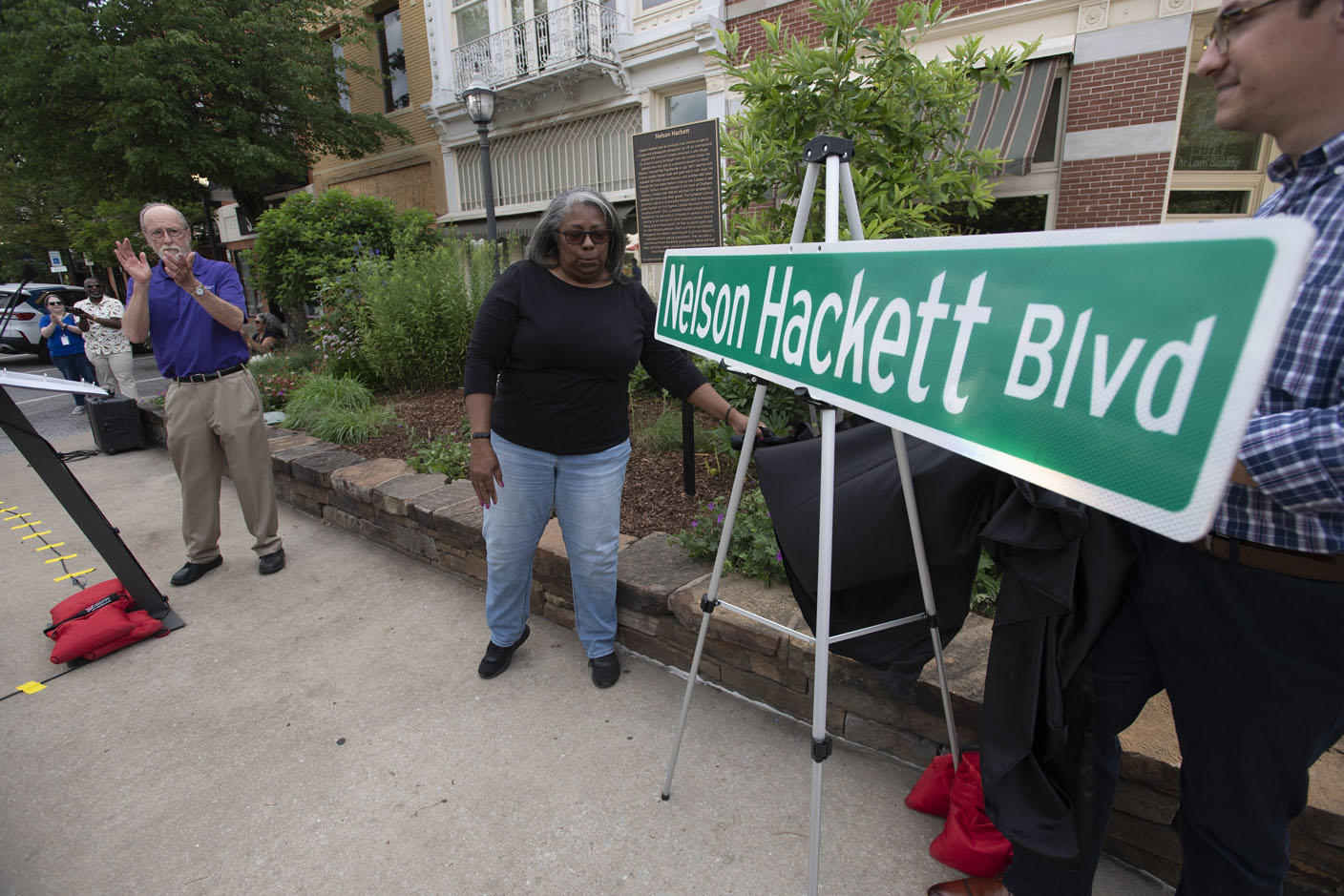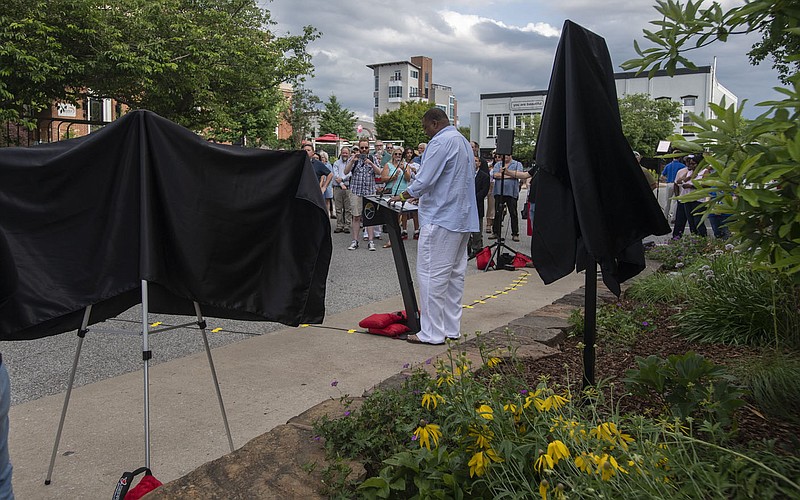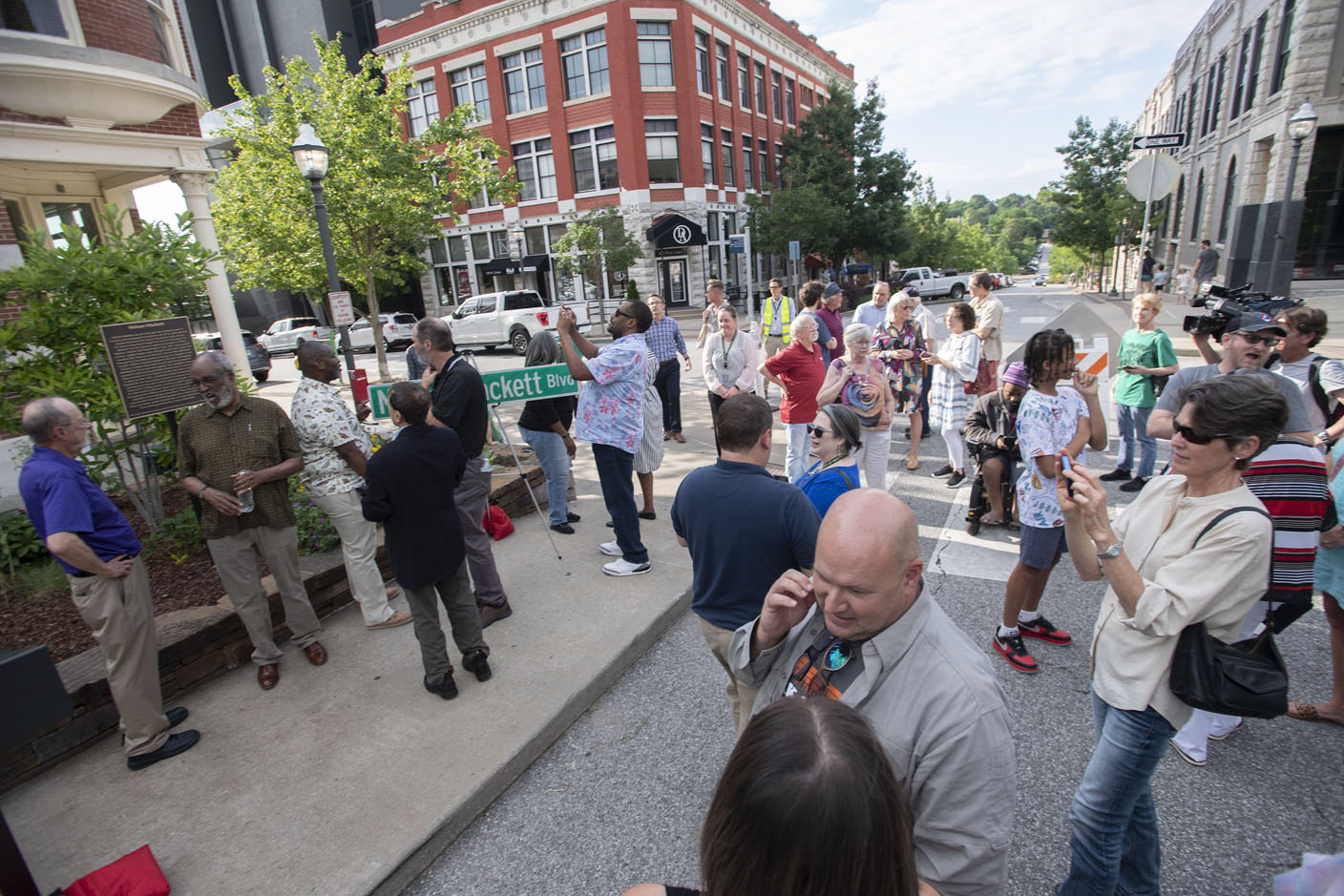FAYETTEVILLE -- Nelson Hackett's place in the city's history was marked Friday at the downtown square about 180 years after he escaped slavery.
Hackett was the first and last enslaved person to be extradited from Canada back to the United States. His journey set off an international discourse on extradition policy.
A marker telling Hackett's story is now installed in the flower bed at the northwest corner of the downtown square, in front of Bank of Fayetteville. Archibald Yell Boulevard will be renamed Nelson Hackett Boulevard. The new street sign also was unveiled Friday.
Hackett was an enslaved man who fled Fayetteville in 1841 seeking freedom, making his way to Canada, according to Michael Pierce, associate history professor at the University of Arkansas, Fayetteville. The man who claimed to own Hackett demanded extradition.
Yell, who served as Arkansas governor at the time, wrote a letter to the colonial governor of Canada requesting Hackett be returned. The request was granted.
Hackett was brought back to Fayetteville in the summer of 1842. He was publicly whipped several times, tortured and sold back into slavery in Texas, according to Pierce's research. He escaped again, and his fate remains unknown.
Abolitionists worried slave owners could have used accusations of theft or other offenses to extradite enslaved people. The British government subsequently made laws preventing such extradition, according to Pierce's research.
Hackett labored near where the marker is displayed on the square. The marker, and the renamed street, serve as a way to remember Hackett's experiences, said Mayor Lioneld Jordan.
"It is also a recognition of the valuable history and heritage and contributions of Fayetteville's Black residents," he said. "Today, we recognize Nelson Hackett's story in a tangible way. He is part of Fayetteville's history and deserves to be remembered."
Several speakers, including Pierce, gave presentations on Hackett and Northwest Arkansas' Black heritage at the Pryor Center before the unveiling ceremony.
Hackett's action set in motion the events that eventually made it possible for thousands of people to escape bondage, Pierce said.
"If we think of it that way, Nelson Hackett should still be the most important, the most famous person in Fayetteville's history," he said.
Tommie Flowers Davis joined the crowd at the square to watch the unveiling and commended the city for starting to address its hidden history. She said she, and many other Black residents she knows, hadn't heard Hackett's name before talk of changing the street name began.
Davis grew up in Fayetteville, in a neighborhood east of the Washington County Courthouse. The neighborhood's history is coming back into the public eye thanks to the work of the Northwest Arkansas Black Heritage Association and Sharon Killian, who also spoke at the Pryor Center on Friday.
"I think this is a historic move, and not without a lot of feathers being ruffled, of course," Davis said. "But it's necessary to start on this path we're going down to get our history out."
J.L. Jennings is chairman of the city's Black Heritage Preservation Commission, which recommended the City Council change the name of the street and place the marker at the square. He said the commission has been working to bring to light some of the city's untold history and to increase feelings of belonging for all residents.
"We believe honoring Nelson Hackett is an important first step in this goal," Jennings said. "It's remarkable to think an enslaved Mr. Hackett could have actually stood here, where his marker is installed today, unknowing of the impact that his life would have on the world. While we do not know how Mr. Hackett's story ended, what we do know is his impact was felt by thousands."
The new street name signs are scheduled to be installed Monday.
 Fayetteville Mayor Lioneld Jordan (left) applauds Friday as Kaleb Turner (right) and Lois Bryant, both members of the of the city's Black Heritage Preservation Commission, unveil a street sign during a dedication ceremony on the Fayetteville square renaming Archibald Yell Boulevard to Nelson Hackett Boulevard. Visit nwaonline.com/photo for todays photo gallery. (NWA Democrat-Gazette/J.T. Wampler)
Fayetteville Mayor Lioneld Jordan (left) applauds Friday as Kaleb Turner (right) and Lois Bryant, both members of the of the city's Black Heritage Preservation Commission, unveil a street sign during a dedication ceremony on the Fayetteville square renaming Archibald Yell Boulevard to Nelson Hackett Boulevard. Visit nwaonline.com/photo for todays photo gallery. (NWA Democrat-Gazette/J.T. Wampler)On the web
See video of the Nelson Hackett unveiling ceremony:
Learn more about the life of Nelson Hackett:
https://nelsonhackettproject.uark.edu


